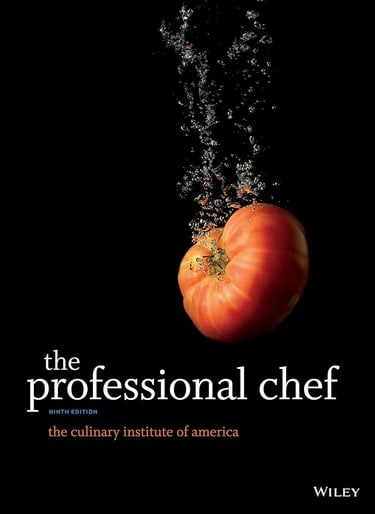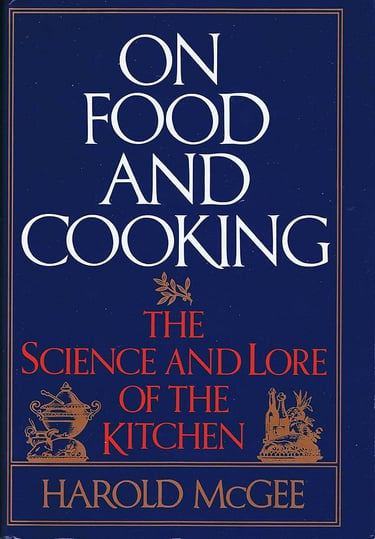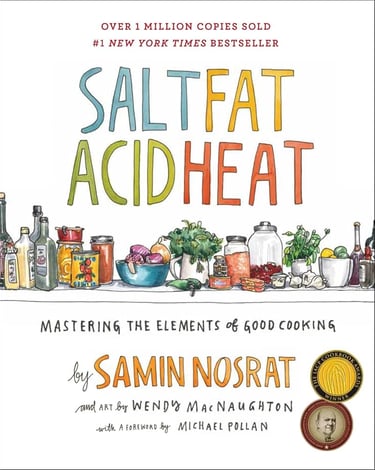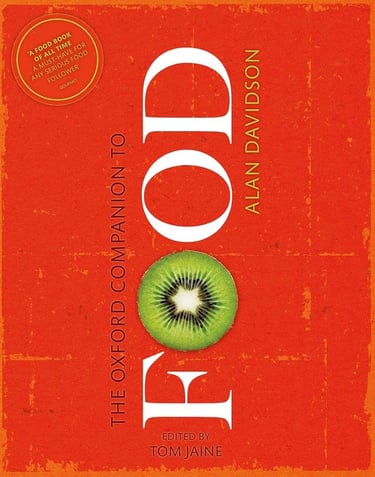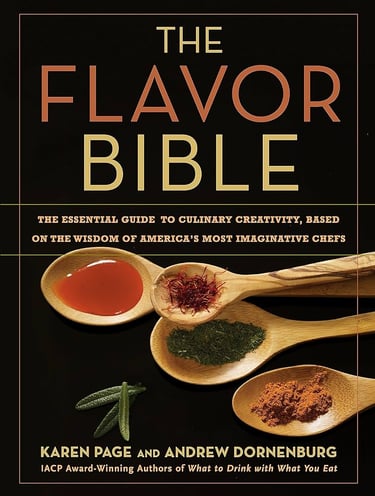5 Essential Cookbooks to Elevate Your Culinary Skills PART 1
Each title on this list not only shares recipes but also imparts valuable knowledge and techniques that can transform one's culinary skills. Here are 5 essential Cookbooks for your kitchen!
3/17/20255 min read
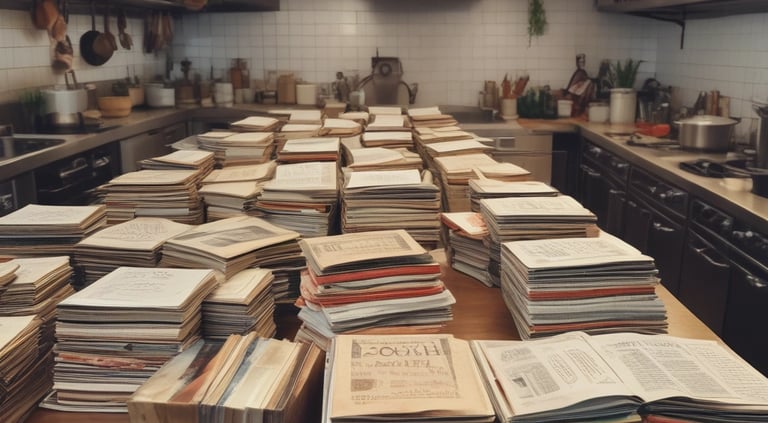

Exploring a selection of essential cookbooks can elevate any kitchen experience. Each title on this list not only shares recipes but also imparts valuable knowledge and techniques that can transform one's culinary skills.
Here are 5 books :
1.The Professional Chef" by The Culinary Institute of America
2.On Food and Cooking: The Science and Lore of the Kitchen" by Harold McGee
3.The Flavor Bible" by Karen Page & Andrew Dornenburg
4.Salt, Fat, Acid, Heat" by Samin Nosrat
5.The Oxford Companion to Food" by Alan Davidson
1.The Professional Chef" by The Culinary Institute of America:
"The Professional Chef" offers a wealth of practical techniques that seasoned chefs and culinary students can adopt. Each method is presented with precise instructions, accompanied by photographs that illustrate the process.
Topics include knife skills, food preparation, and cooking methods ranging from sautéing to sous vide. The book demystifies complex techniques, making them accessible for various skill levels.
Readers benefit significantly by developing their craftsmanship. Mastering techniques enhances efficiency and confidence in the kitchen, allowing chefs to create dishes with precision.
The book serves as a comprehensive guide that covers a wide range of culinary topics. It includes chapters on kitchen organization, food safety, and menu planning, which are vital for professional kitchens.
The depth of information equips chefs to tackle challenges in various culinary environments. Whether managing a busy kitchen or planning a catering event, this resource provides essential strategies.
Additionally, it reinforces the importance of professionalism in culinary practice. Chefs gain insights into teamwork, leadership, and maintaining high standards while navigating the demands of a culinary career.
2.On Food and Cooking: The Science and Lore of the Kitchen" by Harold McGee
'On Food and Cooking' delves into the chemistry and biology of food. By explaining how various cooking methods affect ingredients at a molecular level, it helps chefs make informed decisions.
For example, it explores Maillard Reaction and caramelization, detailing how these processes build flavor through heat application. Understanding these reactions allows cooks to replicate specific tastes and textures with precision.
Additionally, the book discusses temperature effects on proteins, starches, and fats, guiding users to better control cooking times and techniques. This knowledge transforms everyday cooking into a more scientific, reliable process.
The book systematically categorizes ingredients, demystifying their roles in cooking. Each section focuses on specific food groups, providing context about their properties and interactions.
A chef can learn why acid can enhance flavors or how salt affects texture. This knowledge aids in crafting more balanced dishes. The detailed examination of ingredients allows cooks to innovate by combining flavors and techniques based on scientific principles.
Furthermore, the exploration of techniques, such as emulsification and fermentation, sheds light on how to manipulate ingredients. Familiarity with these processes elevates a cook's skill set and creativity in the kitchen.
3.The Flavor Bible" by Karen Page & Andrew Dornenburg
"The Flavor Bible" details numerous ingredient combinations that work harmoniously together, allowing cooks to experiment confidently.
For example, it suggests pairing vanilla with citrus, creating a bright and refreshing flavor profile. Other combinations like tomato and basil or chocolate and sea salt highlight how simple ingredients transform when paired thoughtfully.
Beyond just pairing, "The Flavor Bible" inspires creativity in the kitchen. It encourages cooks to think outside the box when developing their signature dishes.
Seasoning is crucial to achieving a well-balanced dish. "The Flavor Bible" serves as a comprehensive reference, detailing how different spices and herbs enhance various flavors.
Each ingredient entry explains appropriate pairings, guiding cooks in elevating simple meals to gourmet experiences. The book includes recommendations for using thyme with chicken or ginger with carrots, showing the transformative power of seasoning.
This resource proves invaluable when developing recipes or adjusting existing ones. It empowers cooks to refine their pallet and grow their understanding of flavor dynamics in cooking.
4.Salt, Fat, Acid, Heat" by Samin Nosrat
In "Salt, Fat, Acid, Heat," Samin Nosrat articulates that each of the four elements plays a crucial role in the success of a dish. Salt enhances flavor, making dishes taste fuller and more balanced. Fat adds richness, contributing to texture and mouthfeel. Acid brightens flavors, cutting through richness and refreshing the palate. Heat is essential for cooking food properly, affecting texture and flavor development.
By mastering these elements, cooks can create well-rounded dishes. For instance, knowing how to properly season with salt can elevate a simple vegetable dish. Utilization of fats like olive oil or butter allows for diverse flavors and textures, making meals more enjoyable.
The principles outlined in "Salt, Fat, Acid, Heat" can dramatically affect cooking techniques. Recognizing the role of heat can assist cooks in employing appropriate cooking methods, whether grilling, roasting, or braising. Adequate heat ensures proper texture and doneness.
Integrating fat and acid into cooking sauces or dressings can transform a dish significantly. It encourages creativity in flavor combinations and allows for improvisation. Experimenting with different types of acid, such as citrus or vinegar, can lead to unique tastes tailored to individual preferences.
By focusing on these techniques, cooks learn to approach dishes with greater confidence and skill, enhancing their overall culinary repertoire.
5. "The Oxford Companion to Food" by Alan Davidson
This reference book serves as a comprehensive source of information about food, providing readers with a thorough exploration of culinary topics. It combines historical context, cultural significance, and expert definitions, making it a valuable resource for both amateur cooks and food professionals.
The Oxford Companion to Food details culinary traditions from around the world. It covers ingredients, dishes, and cooking techniques, presenting a global perspective that enhances readers' understanding.
The book includes entries on various cuisines, offering insight into regional specialties. For example, it explains the use of spices in Indian cuisine and the importance of fermentation in Asian culinary practices.
Readers can find information on food safety, nutrition, and sustainable practices. This resource helps home cooks make informed choices about what they prepare, enhancing their culinary knowledge and skills.
This encyclopedia delves into the historical significance of food. It explores how food has shaped cultures and societies throughout history.
Entries detail the evolution of agricultural practices and their impact on food availability. Significant culinary figures and movements are also discussed, providing context for modern culinary arts.
Don't forget to share with us your favorite cookbook and why.
Note: As an Amazon Associate, I earn from qualifying purchases — at no extra cost to you.
Note: As an Amazon Associate, I earn from qualifying purchases — at no extra cost to you.
Tasty Tools
Explore kitchen tools, books and recipes.
Concact:
© 2025. All rights reserved.

